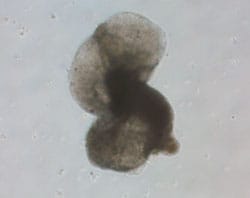Cardiac Research and Repair
Stem Cell research has unprecedented potential to improve treatment for and ultimately preventing heart disease due to the unique capability of stem cells for self-renewal, differentiation into all cardiovascular lineages, and overcoming immune rejection issues.

Ischemic heart disease in its various forms (e.g. myocardial infarction) is the leading cause of death in the United States and industrialized nations. One of the reasons cardiovascular disease remains a significant health problem is that the heart muscle has a diminished ability to regenerate following damage through events such as heart attacks. As a result of an infarct, the heart loses a significant number of cells and exhibits structural changes that result in the formation of scar tissue that prevents the heart from functioning properly.
At NYSCF, we are working to study and model heart disease as it occurs in the body using multiple kinds of stem cells including induced pluripotent stem (iPS) cells and derived relevant cardiac adult cell types and using the latest generation of bioreactors. NYSCF researchers are studying the inflammatory environment present during heart injury and creating better, engineered tissue patches for cardiac repair. To restore function, new heart cells can be delivered to the heart alone or as part of a tissue-engineered graft. However, this process is more complicated than simply injecting the cells or sewing on a patch. NYSCF researchers also work to model the inflammatory environment present at the time of implantation and how this environment can be harnessed to improve the incorporation of the engineered graft for the best possible future treatment results.
|
Learn more about stem cells: Stem Cells 101 | Videos | Stem Cell News
|